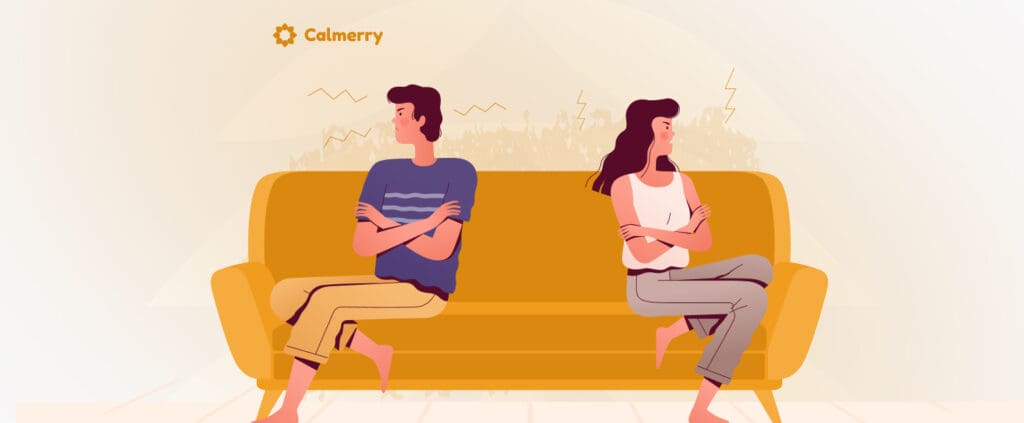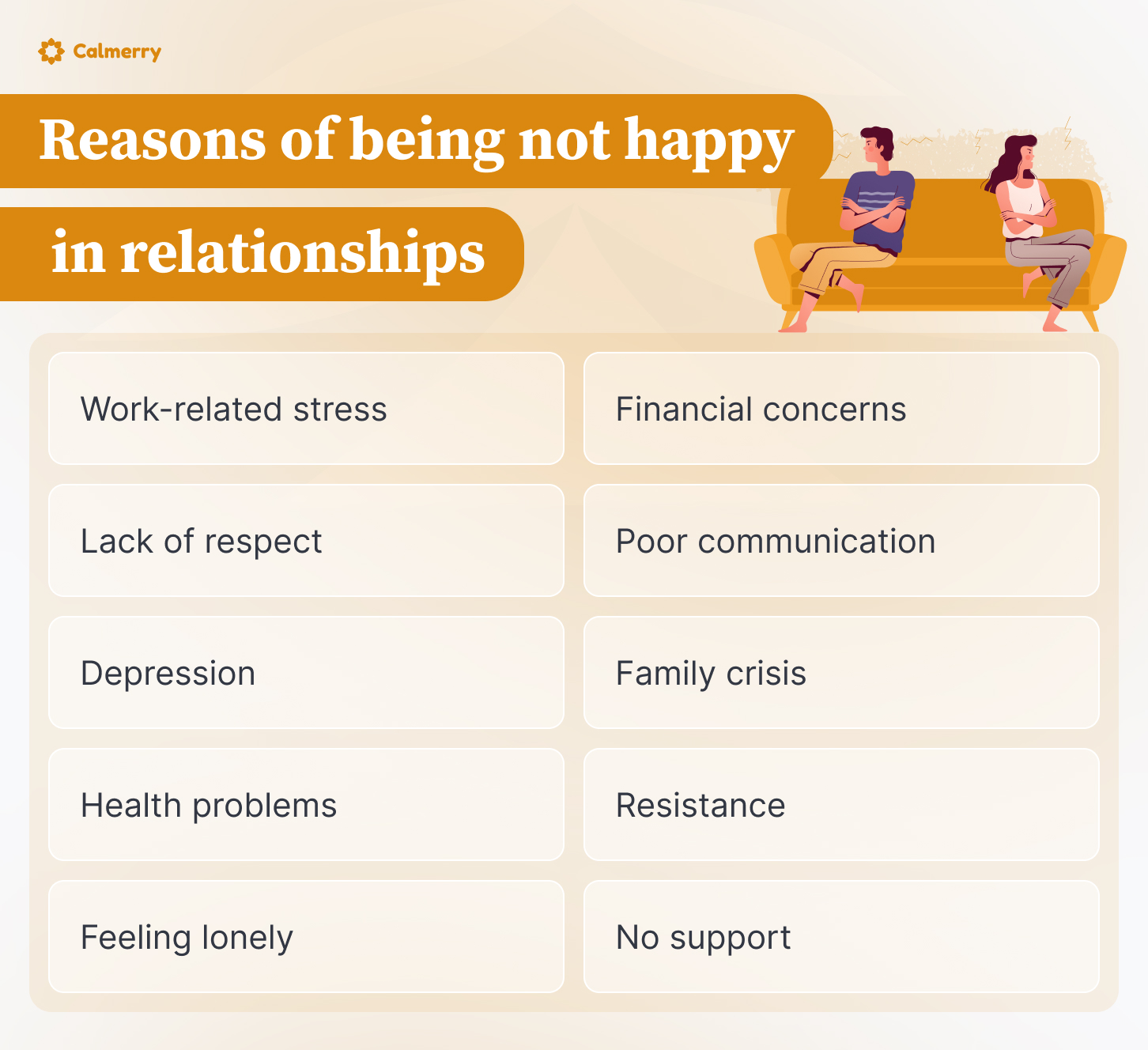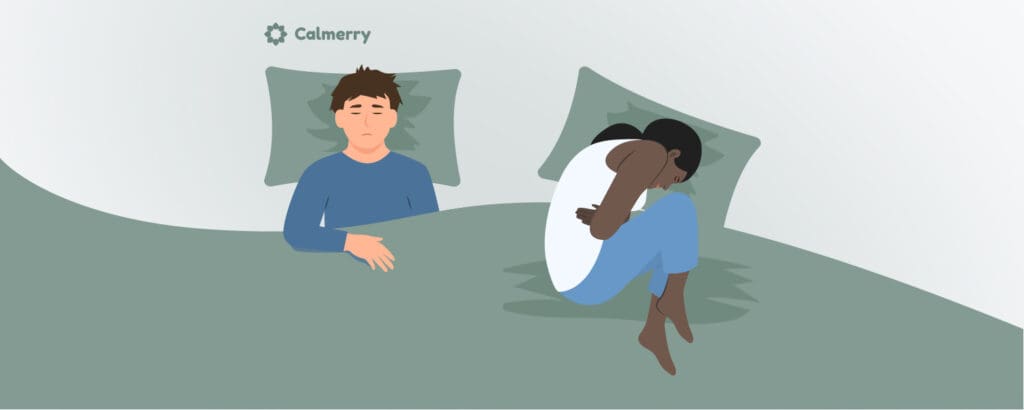What to Do If You’re Not Happy in Relationships?

In this article
Most people desire to have healthy and joyful relationships. But sometimes it might be difficult to achieve them.
Statistically, nearly 19% of people are not happy in relationships; however, they still prefer to stay longer in them. It means most people are still optimistic their unhappy relationships can turn around for the better, while others are just stuck not knowing how to handle the situation.
While ending unhappy relationships may feel like the easy answer or only option, it is not necessarily the best thing in all circumstances. Sometimes, you might want to stay and hold hope that you can find a way to build happiness, increased communication, and satisfaction in these relationships.
If that’s what you want to do, here are some steps to help you.
Reasons for being not happy in relationships
The first step toward improving a relationship is identifying the reasons for the distress in the first place.
You may be unhappy in a relationship due to various reasons, from troubles between you and your partner to personal problems. It is vital to identify the reason why you’re not happy in your relationships.
Understanding the problem will help you find the solution.
Signs of trouble between you and your partner
Various indicators can suggest you’re both unhappy. Here are some common pointers:
- Seeking distractions such as drugs, alcohol, risky behaviors, other partners.
- Easily irritable or feeling disrespected
- Doubting each other’s love
- Looking for excuses not to be at home
- Preferring or going back to your past life or feeling you would be happier in a different life
- Avoiding committing to the relationship
- Spending less time together [1] The Jed Foundation. (2021, August 16). Common relationship problems and how to deal with them | JED. https://jedfoundation.org/resource/common-relationship-problems-and-how-to-deal-with-them/
- Resenting your partner
- Not much to share between partners
- Not enjoying the person’s company
- No longer feeling attracted to your partner
- Finding yourself thinking that you are only staying in the relationship for other reasons (financial, children, fear of being alone)
If you’ve experienced any of the above signs, it’s likely they‘re the cause of your unhappy relationship and it needs improvement.
When you note any sign related to the ones mentioned above, it’s advisable to address them early.
Personal problems
Unhappiness in relationships can also arise from within us. Before you start looking for other sources of joylessness, evaluate yourself first.
So, here is a simple question to ask yourself: Are there personal problems that could make me unhappy?
The problems you’ll think about when answering the above question are the causes of why you are unsatisfied with your partner. They may include:
- Work-related stress
- Financial concerns
- Depression
- Insecurity
- Family crisis
- Health problems
- Feeling lonely
- Low self-esteem
- Trauma
While most of these factors are unrelated to relationships, they’re big contributors to unhappiness. When these things make you feel irritated, you’re highly likely to extend the dissatisfaction and bitterness to your partner.
Addressing personal unhappiness is crucial for healthier relationships. By understanding and resolving your own issues, you can reduce criticism, jealousy, and manipulation, leading to a more positive and fulfilling connection with your partner.
Other сauses
Sometimes, you may not be happy due to reasons beyond yourself.
Some of them are:
- Lack of sex life
- Grudge
- Lack of respect
- Poor communication
- Resistance
- No emotional connection
- Lack of time together
- No support
- Financial challenges
- Differences in core values
Addressing issues like a lack of sex life, grudges, and lack of respect is critical for setting up happy relationships. Improving communication, spending quality time together, and offering support can rebuild emotional connections.
Overcoming resistance and financial challenges ensures a stronger, more fulfilling partnership.
Oftentimes, challenges in the relationship do not exist independently. For example, lack of communication and stress from managing the home or finances can often lead to feeling emotionally disconnected and resulting in a lack of sexual intimacy.
– Tiffany Lovins, Licensed Mental Health Counselor (LMHC)
These challenges are often interwoven and complex and both parties in the relationship have a role in evaluating how they are contributing to the current distress and what each person can do to build healthier strategies for communication and partnership.

Solutions to be happy in relationships
Finding solutions is essential for happiness in relationships because it helps resolve conflicts and misunderstandings. When partners work together to solve problems, it builds trust and strengthens their bond.
By addressing issues promptly, couples create a more positive and harmonious relationship environment. Effective solutions will help turn around your relationships and improve them.
Below are some critical tips to consider to bring happiness back in relationships.
Self-Reflection
To boost relationship satisfaction, we must first self-reflect, identifying our feelings and any red flags within the marriage and family.
Assess your expectations and contributions to the relationship
Examine your expectations from the relationship. Make time to ask yourself if your expectations are realistic. Are you putting in the effort you expect from your partner? Sometimes, dissatisfaction may come from an imbalance in give-and-take or idealized expectations that don’t match reality. Take an honest look at your role in the relationship dynamics.
When you are able to use statements from the “I” perspective, it can help reduce the likelihood for defensiveness and create more receptive communication.
– Tiffany Lovins, Licensed Mental Health Counselor (LMHC)
Such as “I notice that when you get home from work, you tend to get quiet and don’t want to talk with me. When this happens, I have a thought that you may be upset with me. How can I check in with you when this happens to make sure I am not making assumptions and am also supporting you with what you need?”
Both of you should suggest ways to handle these challenges to clarify expectations of each other, make sure needs are met, and boundaries are respected.
Identify personal needs and whether they are being met
What are your core needs in a relationship, such as emotional support, intimacy, security, and shared values? Are those needs being met within this relationship? Generally speaking, most of our dissatisfaction may come from our unmet needs.
Evaluate if unhappiness stems from the relationship itself or external stressors
Is there frustration because of the relationship’s issues, or are there external influences? For example, people at work, family problems, or financial troubles may be causing general dissatisfaction.
If you’re not feeling connected to your partner anymore, try to see if you can pinpoint why. Maybe you feel like you need to rely on your partner for everything, and that’s exhausting for both of you.
Maybe there is some controlling behavior happening on one or both sides. That would make most people feel trapped and unhappy.
Identifying where the frustration comes from is important to finding the appropriate solutions.
Open and honest communication
Being happy in a relationship involves mutual support, open communication, and a deep sense of security.
Importance of discussing feelings with your partner
Share feelings with your partner. When you’re with your partner, let them know how you feel. Do not hold anything back, but do it respectfully. Don’t blame your partner for the problems. Instead, suggest ways to increase happiness in your relationships.
Be realistic and honest with your feelings from your perspective based on what you observe without assigning blame to your partner.
[hightlight]By being open, you may learn that your spouse struggles with the same problems as you[/hightlight], or they may have a solution to some of your problems.
Think of ways to increase happiness in your relationships and commit to fulfilling them. If you fail to find any solutions, it’s a sign that you may need some help. Consider seeking help from a relationship expert. These therapists are experienced in marriage matters and should help you find effective ways to increase happiness.
To achieve a lasting solution, you must be specific to your concerns. Setting out the exact reason for your frustration can help you address them better.
Tips for effective communication
Use “I” statements to express your feelings without blaming your partner (e.g., “I feel hurt when…” instead of “You always…”). Practice active listening by truly hearing and trying to understand your partner’s perspective. Work on improving your relationship. Choose the right time and place for these conversations, ensuring a calm and receptive environment.
Setting boundaries and expressing needs clearly
When you prioritize yourself, you can set clear boundaries and openly talk to your partner. Discuss expectations of each other, leading to more respectful and balanced interactions. It also allows you to bring your best self to a healthy relationship, benefiting both partners.
Try to express your needs clearly. This can often be a challenge for some couples based on differing attachment styles. One partner may feel anxious if issues are not resolved immediately, while the other may tend to avoid and struggle to return to the conversation.
Openly discussing what each person needs and how it makes them feel can help set realistic expectations that feel reasonable and respectful to both while building emotional tolerance.
– Tiffany Lovins, Licensed Mental Health Counselor (LMHC)
For example, “I know you need space to think about what I said and I feel incredibly anxious when we do not resolve conversations. Can we agree to revisit this within 24 hours so you have time to think? I can feel less anxious knowing that we will come back to this conversation.”
Also, allow the other party to express their feelings. Listen to what they have to say, and if need be, give them enough time to think over the issue.
Seek solutions together
Working through difficulties in a relationship often requires actively seeking solutions and rebuilding the connection.
Exploring ways to reconnect
It’s important to explore ways to reconnect with each other. If you and your partner are willing to work on the relationship, find ways to reconnect. This might involve spending quality time together. Show affection to your partner, try a new hobby or activity as a couple, or prioritize each other.
Consider couples therapy or counseling
If you are struggling to communicate with your partner or find solutions on your own, consider seeking professional help. A therapist can provide a safe space for you and your partner to examine issues, improve communication skills, and develop strategies for resolving conflict.
Rebuild trust and intimacy
When trust in a relationship is broken, it’s important to make an effort to rebuild it. This takes time, patience, and consistent effort from both partners. Focus on open communication, honesty, and demonstrating commitment to a healthy relationship.
When to reevaluate the relationship
Sometimes, despite your best efforts, an unhealthy relationship may not be sustainable. If you’re unhappy in your relationship and feel exhausted and lack of support, it might be time to reevaluate the relationship and consider whether it truly aligns with your long-term needs and wellness. It is important to listen to your intuition and prioritize your own happiness and safety.
Focus on self-growth
People tend to lose themselves in relationships. You may immerse yourself in your partner, putting their wants and needs first.
In return, you may unreasonably expect your partner to meet all of your needs, ending up struggling with disappointment and resentment when they are unable to do so.
It’s important to remember to prioritize yourself and consider how other relationships (friends, family, colleagues), interests, and activities can meet some of our needs.
– Tiffany Lovins, Licensed Mental Health Counselor (LMHC)
Putting yourself first in relationships is important because it ensures your needs and well-being are met. This helps you maintain healthy self-esteem and prevents resentment from building up.
Ultimately, self-care fosters a stronger, more fulfilling connection.
Final thoughts
Sometimes, you may be confused when faced with several options. Should you end the relationship or work towards improving it? Well, don’t worry. A couples counselor can offer support and advice that will eventually enable you to make the right decision.
Calmerry has various specialists ready to help you build a stronger relationship by providing a safe space to talk about your issues. Whether individual therapy or couple therapy, they offer relationship advice and guidance on improving communication and understanding between partners.
By working with a psychologist, you can gain insights into your behavior and learn how to build healthier, happier relationships.
FAQ
How can I tell if my unhappiness is due to the relationship or personal issues?
Think about when the frustration began and whether it ended with separation from your partner. Identify whether the relationship has unmet needs that make you unhappy or if it reflects other dissatisfaction in your life.
What steps can I take to communicate my feelings without causing conflict?
Expressing your feelings using “I” statements without blaming your partner is better. When things are calm, it’s a good time to discuss concerns. Focus on specific behaviors rather than talking generally.
How do I know when it’s time to end a relationship?
If you’ve repeatedly tried addressing issues and never see changes, or if the relationship harms your well-being, it’s probably time to consider ending your relationship. Sometimes, a breakup is better than feeling unhappy in your relationship, which will only worsen your emotional and mental health.
What can I do to rebuild happiness and fulfillment in my relationship?
Reintroduce novelty through shared activities and quality time. Openly communicate your needs and desires to your partner and actively listen to theirs.
The Jed Foundation. (2021, August 16). Common relationship problems and how to deal with them | JED. https://jedfoundation.org/resource/common-relationship-problems-and-how-to-deal-with-them/
online therapy
live video session



